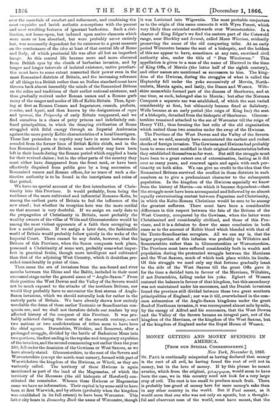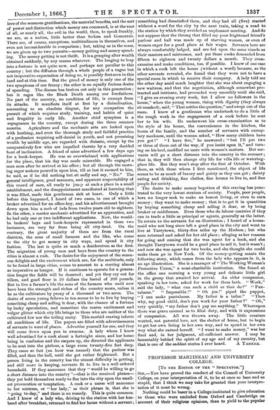MONEY GETTING AND MONEY SPENDING IM AMERICA.
[FROM OUR SPECIAL CORRESPONDENT.] New York, November 2, 1866.
ST. PAUL is continually misquoted as having declared that money is the root of all evil, he having found the root of evil not in. money, but in the love of money. If by this phrase he meant avarice, which from the original, 9:ilXapyvpia, would seem to have been the case, we in this country need not look for a very large crop of evil. The root is too small to produce much fruit There is probably less greed of money here for mere money's sake than in any other country in the world. But if Paul meant, as it would seem that one who was not only an apostle, but a thought- ful and observant man of the world, must have meant, that the
love of the sensuous gratifications, the material benefits, and the sort of power and distinction which money can command, is at the root of all, or nearly all, the evil in the world, then, to speak frankly, we are, as a nation, little better than Sodom and Gomorrah. There are, of course, exceptions, multitudinous in themselves, and even not inconsiderable in comparison ; but, taking us in the mass, we are given up to two pursuits—money getting and money spend- ing. The money getting is not thrift. It is a grasping after wealth obtained suddenly, by any means whatever. The longing to leap into a fortune is not quite new, and perhaps not peculiar to this country ; but the diffusion through a whole people of a vague but not inoperative expectation of doing so, is possibly first seen in this land and at this time. But the greed of money is only one of the two symptoms of our frenzy ; the other is an equally furious desire of spending. The disease has broken out only in this generation ; but it rages like the Black Death among our forefathers. No part of the country, no condition of life, is exempt from its attacks. It manifests itself at first by a disinclination, amounting to an absolute disgust, for any occupation the pursuit of which requires study, training, and habits of quiet and frugality in early life. Another chief symptom is a repugnance to the country, except during the three summer months. Agriculture and the mechanic arts are looked upon with loathing, and even the thorough study and faithful practice of a profession requiring self-denial in youth, and not promising wealth by middle age, are regarded with distaste, except by the comparatively few who are impelled thereto by a very decided bent of inclination. A friend of mine advertised a few days ago for a book-keeper. He was so overwhelmed with applications for the place, that his day was made miserable. He engaged a man soon after he arrived at his office ; but all through the morn- ing eager seekers poured in upon him, till at last it seemed to him, he said, as if he did nothing but sit sadly and say, "No." The general intelligence, good manners, and apparent respectability of this crowd of men, all ready to jump at such a place in a small establishment, and the disappointment manifested at learning that it was filled, made this gentleman sick at heart. Only a little before this happened, I heard of two cases, in one of which a broker advertised for an office-boy, and his advertisement brought down upon him a mob of lads from twelve years old to eighteen. In the other, a master mechanic advertised for an apprentice, and he had only one or two indifferent applications. Now, the would- be brokers' boys and book-keepers represented in these two instances, are very far from being all city-bred. On the contrary, the great majority of them are from the rural districts, the sons of small farmers and the like, who come to the city to get money in city ways, and spend it city fashion. The last is quite as much a desideratum as the first. The migration of young men and boys from the country to the cities is almost a rush. The desire for the enjoyment of the sensu- ous delights and the excitement which are, for the multitude, only to be found in large cities, seems to amount to a craving almost as imperative as hunger. If it continues to operate for a genera- tion longer the fields will be deserted ; and yet they cry out for tillers, and good flour is 20 dollars the barrel of 200 pounds. But to live a farmer's life the sons of the farmers who until now have been the strength and riches of the country scorn, unless it be as the cultivators by proxy of a thousand or two acres. The desire of seven young fellows in ten seems to be to live by buying something cheap and selling it dear, with the chance of a fortune by lucky speculation, and meantime the coarse excitement and vulgar glitter which city life brings to those who are neither of the cultivated few nor the toiling many. This morbid craving infects all conditions of life. The papers are filled with advertisements of servants in want of places. Advertise yourself for one, and they will come down upon you in swarms. A lady whom I know well advertised for a cook about a fortnight since, and her house being in confusion and the carpets up, she directed the applicants to be sent into the parlour, a large room twenty-five feet deep. They came so fast (an hour was named) that the parlour was filled, and then the hall, until she got rather frightened. But a person living in the country has the utmost difficulty in getting, and still more in keeping, servants fit to live in a well ordered household. If they announce that they "would be willing to go a short distance into the country "—that is the received phrase— they yet hold themselves ready to flee into the city upon the small- est provocation or temptation. A cook or a nurse will announce to her mistress, or "her lady," as their phrase is, that she is "going. to-day," and there is no remedy. This is quite common. And I knew of a lady who, driving to the station with her hus- band after breakfast, returned to find her house without a servant; something had dissatisfied them, and they had all (five) started without a word for the city by the next train, taking a road to the station by which they avoided an unpleasant meeting. And do not suppose that the throng that filled my poor frightened friend's parlour and hall was made up of starving women, or even of women eager for a good place at fair wages. Servants here are always comfortably lodged, and are fed upon the same viands as their masters and mistresses, and yet those cooks demanded from fifteen to eighteen and twenty dollars a month. They cross- examine and make conditions, too, if possible. I knew of one case in which a cook left the house (without a word) because, as the other servants revealed, she found that they were not to have a special room in which to receive their company. A lady told me the other day amid much laughter that she was about engaging a new waitress, and that the negotiation, although somewhat pro- tracted and intricate, had proceeded very smoothly until she mid, "I give an evening every week, but I allow no followers in the house," when the young woman, rising with dignity (they always sit unasked), said, "That settles the question," and swept out of the room. I knew of a gentleman who undertook to do a little of the rough work in the engagement of a cook before he sent her to his wife. He underwent his cross-examination as to the style of his house, the conveniences in the kitchen, the hours of the family, and the number of servants with exemp- lary meekness, until the woman asked, "How many children have you got?" "I have five," he answered ; "but I'll put two or three of them out of the way, if you insist upon it," and turn- ing on his heel, meddled no more with women's matters. But ser- vants will go a short distance into the country in the summer ; that is, they will then change city life for villa life or watering- place life. But they won't stop after the first of October. With them, as with those whom I first mentioned, the object of life seems to be as much of luxury and gaiety as they can get ; dainty eating and drinking, fine clothes, fine houses to live in, and fine people for society.
The desire to make money begotten of this craving has pene- trated to the very lowest stratum of society. People, poor people, here no longer seek to make an honest living, or even to earn money ; they want to make money ; that is to get it in quantities by buying something cheap and selling it dear, or by being broker or middleman. Even those who do labour contrive if they can to trade a little as principal or agents, generally as the latter. To return to the servants for an illustration ; I heard of a house- maid who not long since left a good place in the city and went to live at Tarrytown, thirty-five miles up the Hudson ; but who
soon returned and asked for her old place ; alleging as her reasons for going and coming that she was agent for a book, and she
thought Tarrytown would be a good place to sell it, but it wasn't ; and now she was agent for two books, and she thought she could make them go in New York. Of the money-getting mania the following story, which comes from the lady who appears in it, is an apt illustration. She is a manager of "The Working Woman's Protective Union," a semi-charitable institution. She found at
the office one morning a very young and delicate little girl in the group that awaited her arrival. An older companion, speaking in her turn, asked for work for them both. "Work,"
said the lady, "what can such a child as that do?" "Pan- taloons." " Impossible !" " Oh yes !" piped the puppet, "I can make pantaloons. My father is a tailor." "[hen why, my good child, don't you work for your father ?" "Oh," very quickly, "my father don't pay me anything." Whereupon there was grave counsel as to filial duty, and with it expressions of compassion. All was thrown away. The little creature wanted, not parental love, not the shelter of home, but to begin to get her own living in her own way, and to spend in her own
way what she earned herself. "I want to make money," was her final and, in her judgment, all-sufficient answer. I may be lamentably behind the spirit of my age and of my country, but that is one of the saddest stories I ever heard. A YANKEE.































 Previous page
Previous page